Search
Showing 10 of 6394 results
-
Intelligence
On this page are links to a number of websites that host
IntelliLab
This is ENZ's intelligence hub for international education providers and hosts the latest information on student numbers and trends, market information, industry valuations, research, and insights on recent developments, to help industry make informed decisions. Home | ENZ IntelliLab
Ministry of Foreign Affairs and Trade Market reports
In these market reports you will find the latest market intelligence from New Zealand's Ministry of Foreign Affairs and Trade. MFAT Market Intelligence Reports | New Zealand Ministry of Foreign Affairs and Trade
New Zealand Trade and Enterprise
On this website, are market guides and events to support businesses with their export journey. NZTE helps New Zealand businesses grow in international markets
-
International Business
On this page are links to websites that have useful information to support businesses as they head overseas to international markets.
Business.govt.nz
For tools and expert advice from government and industry, this website is designed to help businesses save time and succeed. Home — business.govt.nz
New Zealand Trade and Enterprise
On this website, are market guides and events to support businesses with their export journey. NZTE helps New Zealand businesses grow in international markets
-
Sign up to the Immigration New Zealand International Education email
People working with the international education sector can sign up to receive emails from Immigration New Zealand with information and updates on international education and immigration matters.
These emails are aimed at education providers and offshore agents acting for students but may be of interest to others involved with the international education sector.
Subscribe to updates & newsletters | Immigration New Zealand
-
Smart waste management idea sees students take out top spot in KIWI Challenge Indonesia finals
The theme was “Reforming Indonesia’s mobility and smart cities using AI technology”. This year’s initiative hosted 59 teams from across 37 schools for a total of 269 student participants, the highest ever at the KIWI Challenge.
The groups were required to submit video entries to a judging panel made up of AUT academics and ENZ representatives, who reviewed the submissions and selected finalists. Participants received mentoring from a New Zealand university academic through the process and took part in workshops to refine their business plans. They were given a taste of New Zealand’s learning environment along the way and built an understanding of our tertiary education offering for future planning.
The participating academic was Dr Taghreed Hikmet from AUT, a Senior Lecturer in International Business, Strategy, and Entrepreneurship who has expertise in smart cities and is passionate about mentoring and inspiring young future leaders.
The finals were held on Saturday 25th November, where six shortlisted teams from across Indonesia presented their ideas to a panel of judges made up of Dr Hikmet (AUT), Ben Burrowes (ENZ’s Regional Director, Asia), and Indonesia Embassy staff (representing Ministry of Foreign Affairs and Trade), Hira Trisnoputri.
UniSadhuGuna International College took first place with their ‘Greenlight’ business idea, a smart waste management enterprise which aims to create a sustainable waste management system that actively involves households, businesses, and the government. UniSadhuGuna International College received a voucher worth 10,000,000 Indonesian Rupiah for winning the competition.
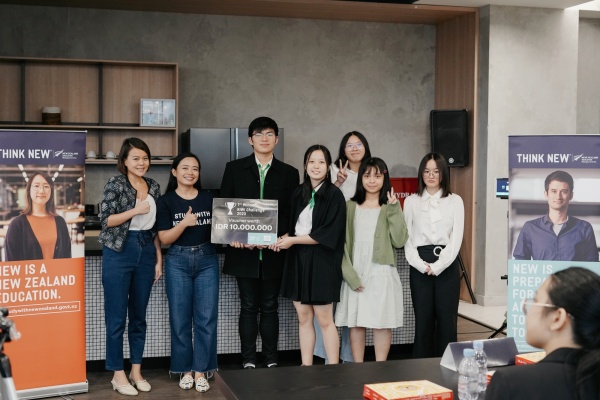
Winners! The team from UniSadhuGuna international College took out first place with their ‘Greenlight’ business idea.
Dr Hikmet reflected on the KIWI Challenge warmly. “It has been truly rewarding, observing the outstanding progress and growth in the finalists' projects, presentations, and overall confidence.
"It was a privilege to engage with high school students across Indonesia, contributing to the vibrant entrepreneurial spirit fostered by the competition. Excitement brews within me for the potential of future collaborations and initiatives,” Dr Hikmet concluded.
Following the finals, Ben Burrowes and Dr Taghreed Hikmet participated in an Instagram Live session with KOMPAS TV, the leading media network in Indonesia. This Instagram Live generated a total of 3.4k views and the highest number of people watching online was 348. You can watch the Instagram Live here: Part 1 and Part 2.
-
Welcome to New Zealand scholarship winner announced
This year’s Welcome to New Zealand scholarship marks 70 years of diplomatic relations between Germany and New Zealand. Each year these scholarships are used as an opportunity to promote New Zealand as a study destination and showcase the global connections between New Zealand and Germany through education. The scholarships are aimed at students who are interested in spending a semester abroad or studying for a full degree (bachelor’s or master’s) at a New Zealand university or Te Pūkenga. The scholarship covers part or the entire tuition fees.
Each year, Education New Zealand Manapou ki te Ao awards one scholarship of €8,000 and six scholarships of €2,500. This year, we received 352 applications and the seven award winners were selected last month, representing a diverse range of study areas.
The winner of the main €8,000 scholarship is Felix Herold, who is currently studying Historical Linguistics and Spanish at the Friedrich- Schiller University Jena. Felix has a keen interest te reo Māori and Pacific languages. He will start his semester abroad in April 2024 at Victoria University of Wellington.
New Zealand is an attractive destination for German students looking for a high-quality education and an unbeatable student lifestyle abroad. The latest student visa numbers indicate a strong recovery in the number of German students heading to New Zealand for university study. A high level of interest was also seen recently at the GOstralia!-GOmerica! Down Under & USA Fair in Stuttgart, where ENZ joined NZ universities to engage with prospective students. The EAIE Conference, one of the largest international education events in the world, was held in Rotterdam this September and proved a great opportunity for all eight New Zealand universities and Te Pūkenga to connect with key stakeholders and partners from across Europe. There is a positive outlook with growing numbers of students from Europe choosing to study in New Zealand and opportunities for diversification in areas such as Scandinavia.
Anyone who is interested in finding out more about the scholarship options available for study in New Zealand, can visit our scholarships page here - Scholarships in New Zealand: Find a scholarship | Study with New Zealand.
We look forward to welcoming Felix and the other scholarship winners to New Zealand next year.
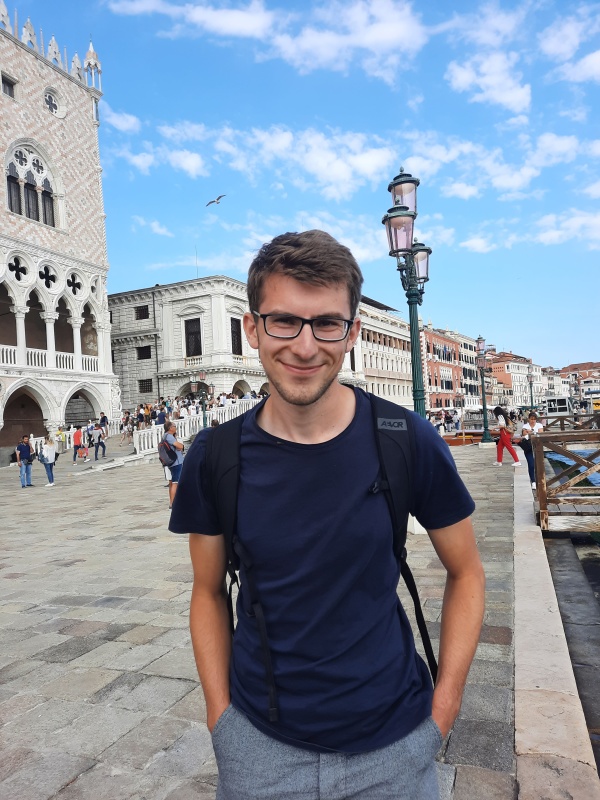
-
Summer in Aotearoa New Zealand – Explore, have fun and stay safe!
Education New Zealand Manapou ki te Ao (ENZ) is supporting students to explore New Zealand this summer with an emphasis on staying safe during their holiday break.
NauMai NZ has dedicated pages on outdoor safety, water safety, road safety and the New Zealand climate, supporting students to prepare for their activities over the summer. NauMai NZ also has information on the cities and regions of New Zealand, along with recommendations of things to do and see and how to get there.
ENZ reminds students to keep themselves safe from scams. If students have lost money in a scam or have been the victim of an online scam where threats have been made against them, they can contact the NZ Police who are here to help. Phone 105 or report online.
Summer is a great opportunity to take a break from study and find time to relax and explore our beautiful country. There is plenty to see and do in New Zealand but students can also take steps to stay safe, wherever they are and whatever they are doing. NauMai NZ is here to help them.
Happy summer holidays!
-
ENZ calls for funding proposals for New Zealand-China research partnerships
Funding proposals are due by 1 March 2024. Download the New Zealand-China Tripartite Partnership Fund 2024 Guidance and Call for Proposals and the Proposal Form. Send your completed proposal as a PDF, and any questions, to china@enz.govt.nz.
The New Zealand-China Tripartite Partnership Fund 2024 offers funding of up to NZD 20,000-30,000 including GST for each partnership project, with the call for proposals open until 1 March 2024.The fund supports new or existing research partnerships between New Zealand and Chinese universities. There are usually three universities involved – two from China and one from New Zealand.
The Tripartite Partnership Fund, administered by ENZ, has a pool of up to NZD 100,000 in 2024 for research partnerships in the arts, humanities, social sciences, sciences and applied sciences. Designed to encourage strategic academic relationships, the fund focuses on fostering relationships and the development of the partnership rather than funding the research itself.
The Tripartite Partnership Fund is a key piece of education cooperation between New Zealand and China. Projects under the fund have enjoyed a high level of visibility and attention in both New Zealand and China. For example, the Tripartite Partnership and its projects were highlighted during the visit to New Zealand by China’s Minister of Education H.E. Huai Jinpeng in August 2023.
Lisa Futschek, General Manager International, is encouraged by the interim reports of the current Tripartite Partnership Fund recipients and their accounts of travel to China to reconnect and work with their partners this year following the pandemic.
“It is great to see the reciprocal exchanges between New Zealand and Chinese research partners thriving with mobility between the partners leading to promising research outputs,” Ms Futschek said.
Established in 2005, the Tripartite Research Partnership is a valued part of the New Zealand – China bilateral education relationship and we welcome proposals from researchers to join the growing list of funding recipients.
Funding proposals are due by 1 March 2024. Download the New Zealand-China Tripartite Partnership Fund 2024 Guidance and Call for Proposals and the Proposal Form. Send your completed proposal as a PDF, and any questions, to china@enz.govt.nz.
-
EdTech famil programme provides eyes on New Zealand for innovation
The programme included visits to Singapore, Viet Nam and Indonesia by a New Zealand delegation that included nine companies. The nine companies had a diverse range of education expertise, products and services from cutting edge Neuroscience for early childhood education to delivering TV-style drama series for English language education young adults. Six core companies participated across the three counties - Language fuel, Neurofrog, Chasing time English, StepsWeb, Jix Reality, and PipiLearning, while three additional companies already in the regions Writers' toolbox,Komodo wellbeing and Kami, joined the Singapore programme for specific elements.
The programme included meetings with the Ministries of Education of all three countries, specifically to understand the digital adoption and education roadmaps of each. Singapore shared their Transformation of education technology masterplan 2030 as a capability multiplier for educators and learners, and Viet Nam shared their focus on and investment in technology and management systems and using education technology to build the human potential of their citizens. Indonesia shared their Super App which allows for their 646.2 thousand schools, 4.2 million teachers and lecturers and 71 million students to all benefit from the large-scale acceleration of an economy moving at pace with a firm policy that ‘no one is left behind’.
Alana Pellow, ENZ’s Business Development Manager, led the delegation and said that the programme was carefully put together to ensure the visit was as much about showcasing New Zealand’s expertise and innovation in EdTech as it was to learn about what other countries and leaders in this space are doing.
“Across the three countries, the EdTech companies had the opportunity to meet and visit education providers from schoolteachers and leaders, vocational education providers and universities to education enrichment centers. They also heard from New Zealand business leaders and government agencies in each region, as well as had briefings and networking with local EdTech owners to gain a deep understanding of the economic and EdTech landscapes in each country.
“The public, private and enrichment education landscapes, which offer significant opportunity for EdTech’s, was a great eye opener particularly in Early Childhood Education (ECE), English language, literacy and English language teacher’s space.
“For example, in Viet Nam it is not uncommon for parents to spend 30% of their income on education – including after school enrichment education such is the ambition of parents for their children,” said Alana.
The private school market across all three markets is viewed as particularly significant for New Zealand. During the visit, it was noted by a number of diverse education related professionals how the New Zealand EdTech group were subject matter experts with education specific capabilities and expertise across many areas from linguistics, literacy, English language, teaching, academic R&D and collaboration with recognised and respected global experts such as – Oxford University Press, Oxford University, Royal Melbourne Institute of Technology, National University of Singapore, Institute of Technolgy Education and the University of Auckland.
Interest in New Zealand’s Education Technology was picked up by the local press in Indonesia and Viet Nam, with Viet Nam in particular seeing 17 stories feature across its various media channels. This has provided valuable visibility of New Zealand’s innovation and expertise in digital education across a wide education subsector value base from ECE and K-14 to R&D at tertiary level. Positive leads have followed and the founder and CEO of SIS and Inspirasi schools, which has schools across Indonesia, South Korea, Myanmar, and India, has already been in touch with two of the NZ EdTech companies to explore future collaboration.
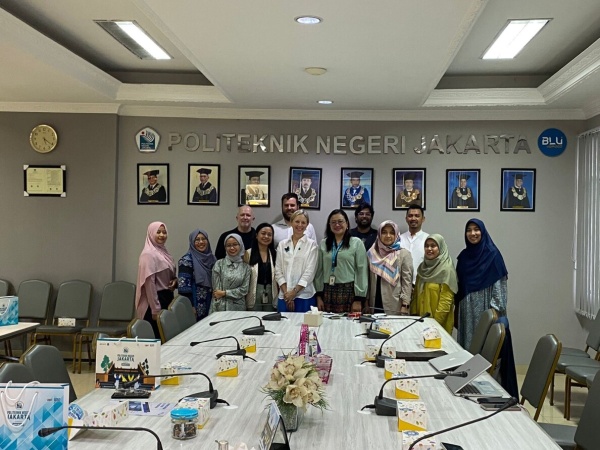
Meeting with Politeknik Negeri Jakarta (VET) Indonesia.
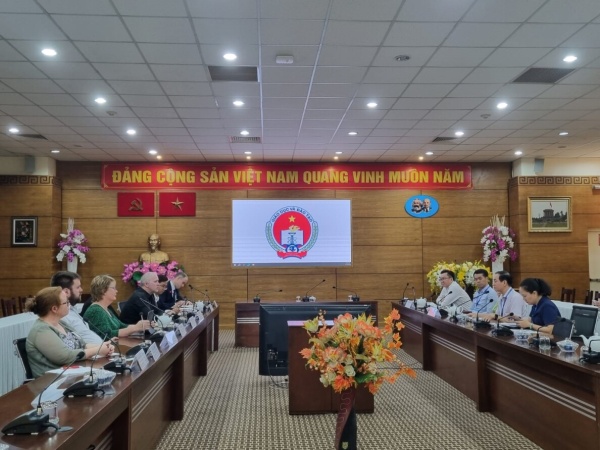
ENZ’s EdTech delegation meeting with Mr. Nguyen Bao Quoc, Deputy Director (Digital Transformation), and colleagues at the HCMC Department of Education & Training, Ho Chi Mihn City, Viet Nam.
The delegation also attended the EDUtech Asia Policy Summit in Singapore where education, education policy makers and education technology solution providers came together from across Southeast Asia. Highlights included:
- The pace and scale at which many SEA countries are upskilling and shifting their policy and philosophy to equip their educators, citizens and systems to be meaningfully productive.
- That digital literacy training is not just the domain of learners. Educators also need high quality digital training, materials and resources.
- Artificial Intelligence is forcing a rethink on everything and in assessments, what do we care about assessing? Knowledge attainment or the deep skills for being human?
- Partnership is hard but offers competitive advantage and ‘’success’’ when human skills are done well, and many global universities are doing partnership well and reaping the rewards.
Any New Zealand EdTech and Education publisher companies interested in finding out more about the SEA market can contact Alana Pellow - alana.pellow@enz.govt.nz
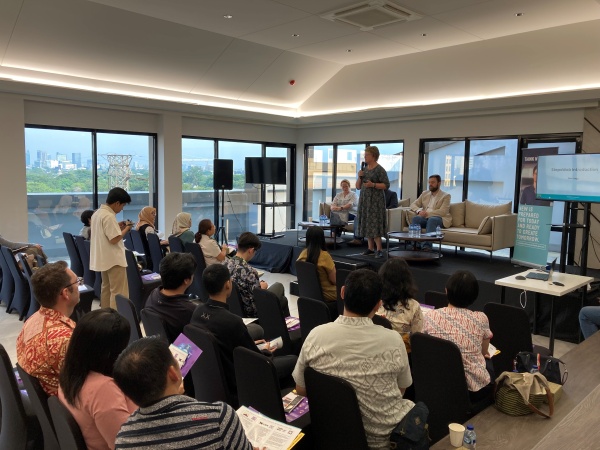
ENZ’s EdTech delegation meeting with Mr. Nguyen Bao Quoc, Deputy Director (Digital Transformation), and colleagues at the HCMC Department of Education & Training, Ho Chi Mihn City, Viet Nam.
-
Government delegation from South Korea visits New Zealand to reconnect with several of our education providers
New Zealand and South Korea have strong education links and one unique partnership is the education cooperation under the Korea-New Zealand Free Trade Agreement (KNZFTA) which has historically included education programmes for Korean school and tertiary students.
The visiting delegation included representatives from the Korea Ministry of Food, Agriculture and Rural Affairs (MAFRA), the Korea Ministry of Oceans and Fisheries (MOF), the Korea Agency of Education, Promotion and Information Service in Food, Agriculture, Forestry and Fisheries (EPIS) and Korea Fisheries Resources Agency (FIRA), the implementing agency for the MOF-funded project.
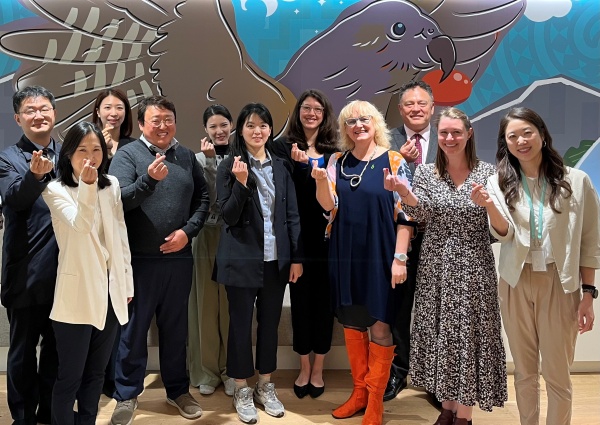
The delegation was welcomed to the ENZ Wellington office with a mihi whakatau on their first day. ENZ, Ministry of Education (MoE) and Ministry of Foreign Affairs and Trade (MFAT) colleagues joined together for waiata and kai with our Korean guests.
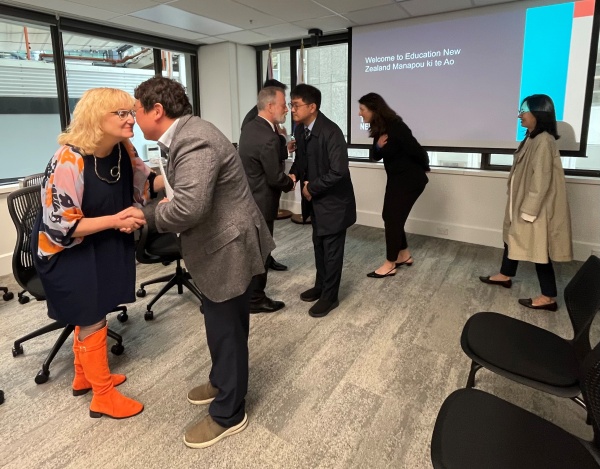
Following a welcome and mihi whakatau in Wellington, the group travelled on to Nelson where they visited Te Pūkenga Nelson Marlborough Institute of Technology (NMIT) and Nayland College. The visit to Nayland College was an opportunity for the Korean representatives to gain a better understanding of the pastoral care for school students and the unique offerings such as outdoor education and horticulture programmes.
Kay Lee, ENZ Senior Market Development Manager – Korea, said it was important for the Korean delegation to experience firsthand the welcoming and safe environment of New Zealand schools to regain confidence in the Schools Visits Programme.
“After the COVID-19 pandemic, the Korean Government was concerned about sending students, especially younger students, overseas to study particularly on scholarship programmes because parents wanted assurance their children will be well looked after. In the debrief with the Korean representatives, it was clear they gained confidence from speaking to the New Zealand institution representatives around the procedures and systems in place to support students.”
“We hope that this renewed confidence will mean that we start seeing Korean government scholarship school students studying in New Zealand again in the near future”.
High on the agenda during the delegation’s visit were the School Visits and Tertiary Training Programmes, both of which were affected significantly during the pandemic.
From 2016 –2019, the School Visits Programme provided 150 high school scholarships per year for South Korean students from rural areas to attend New Zealand schools for eight weeks. The Korean Government planned to continue the Schools Visits Programme with its own funding in 2020, however, the programme was cancelled due to travel restrictions during the pandemic.
An alternative programme was run by MAFRA and MOF from December 2022 which involved short-term English Language Training for school students in Korea with three New Zealand teachers travelling to Korea to teach English (Read about their experience here).The Korean organisers have decided to run the English language programme in Korea again with six New Zealand teachers traveling to Korea to teach English in January 2024.
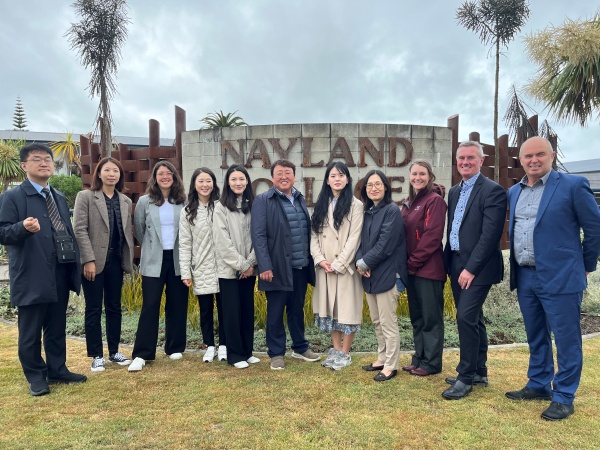
Nayland College demonstrated manaakitanga by welcoming the group to rainy Nelson but provided an Asia Kiwi lunch complete with meat pies and sushi!
Like the Schools Visits Programme, the pandemic interrupted tertiary programmes and the revised programme ran in January 2023 with short term group programmes. The site visits in November to Te Pūkenga NMIT and Lincoln University provided an opportunity to discuss the institutions’ proposals to host Korean tertiary students in January 2024.
Also discussed was the importance of reciprocity and it was noted that Korea is a popular destination for New Zealanders under the Prime Minister’s Scholarship for Asia (PMSA) scheme. Since 2016, the scheme has awarded scholarships to 196 individuals or groups for study, intern or research programmes in Korea. Lincoln University, in particular, has been successful in facilitating group PMSA programmes focused on agriculture to Korea.
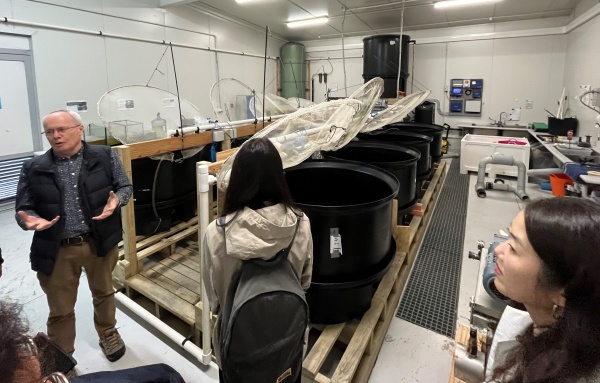
Dr Mark Burdass, Aquaculture Programme Coordinator and Tutor, introduces the hands on learning in the aquaculture programme at Te Pūkenga NMIT.
At the conclusion of their visit, the Korean delegation expressed their gratitude to the institution hosts for making their time in New Zealand memorable and valuable through fruitful discussions. The delegation emphasised the importance of conducting these meetings in person and visiting the campuses to meet with institution staff and academics. The ENZ Manapou ki te Ao team is pleased to continue close cooperation with our Korean education partners to facilitate connections with New Zealand education providers for the education programmes.
If you are interested in finding out more about the education initiatives originally outlined in the KNZFTA, you can read about this in a 2016 E-News article here - New opportunities for New Zealand and Korea.
-
Around the world in five
Asia
The government of Hong Kong has announced ambitions to become an international hub for post-secondary education with measures including an increased quota for international undergraduates at public universities, more scholarships and work rights for postgraduate students.
North America
Canada is set to introduce a “recognised institution” framework, through which colleges and universities with a positive record of vetting and supporting international students may be eligible for fast-track study permits. This comes after over 100 Indian students faced potential deportation earlier this year after their admission letters to Canadian colleges were found to be fake, which the students were unaware of.
Middle East
A British school in Abu Dhabi that has been rated outstanding by the Emirate's school regulator for promoting the UAE's national identity said it has weaved elements of the country's culture, history, heritage and, Arabic language into its UK curriculum. The British International School Abu Dhabi is home to 2,080 pupils from 96 countries, with one in five pupils at the school being Emirati.
Europe
According to the Irish Higher Education Authority (HEA), In 2022/23, Ireland set a new all-time high for the number of international students studying at Irish universities. 33,480 students were enrolled at Irish universities last year, an increase of nearly 12% compared to 2021/22, according to the report. Furthermore, India’s student population in Ireland has grown by a significant 17.8%, reflecting a surging trend.
Africa
South African business schools are a higher education success story and champions in terms of higher education on the African continent. Though competing for students, they display a strong ethos of collaboration, generated by a sense of shared purpose to upskill a “new” country. These schools show the power of collaboration, common purpose, and internationalisation outlook.


